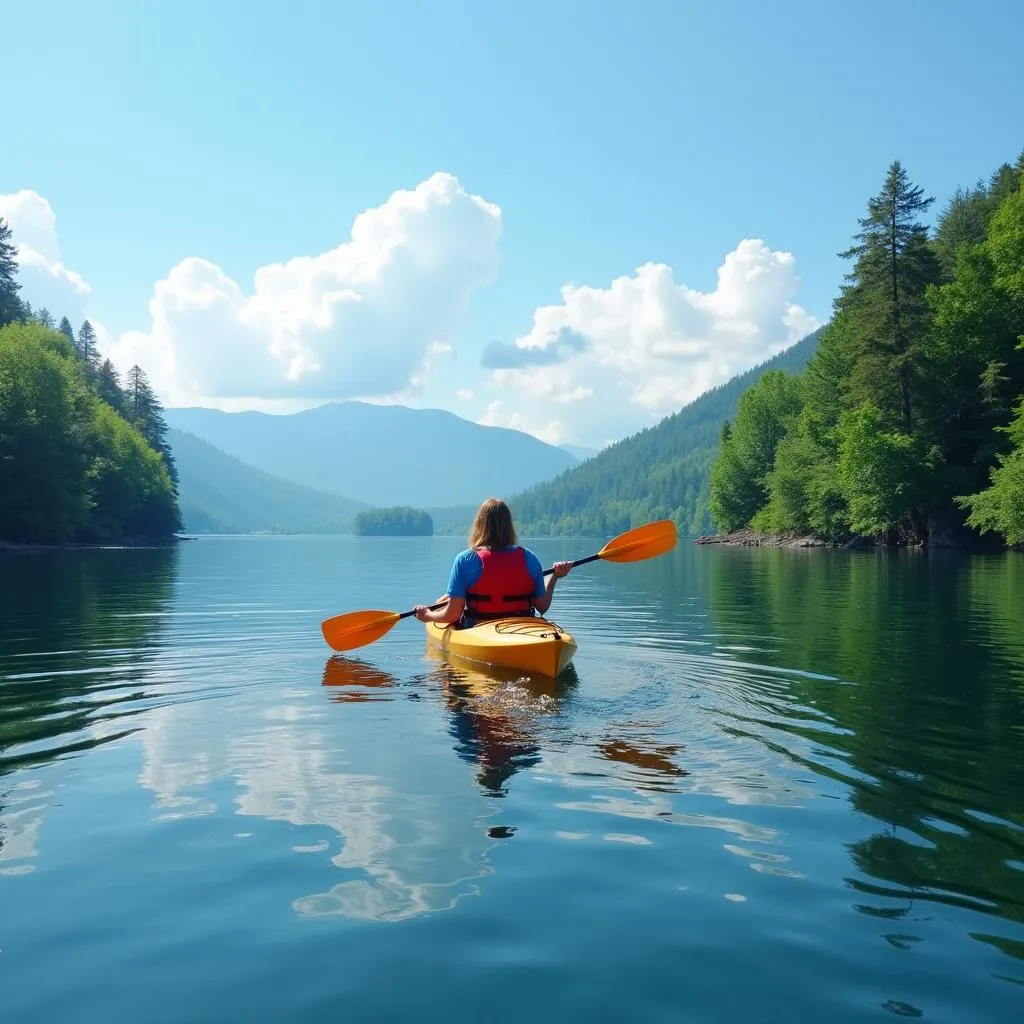The IELTS Speaking test often includes questions about hobbies, interests, and activities. One common topic that frequently appears is describing an outdoor activity you want to try. This article will provide you with valuable insights and strategies to excel in this speaking task, helping you achieve a high band score.
Nội dung bài viết
Part 1: Introduction and Interview
In the first part of the IELTS Speaking test, the examiner may ask you some general questions about outdoor activities. Here are some potential questions and a sample answer:
- Do you enjoy outdoor activities?
- What kind of outdoor activities are popular in your country?
- Have you tried any new outdoor activities recently?
Let’s focus on the third question:
Sample answer (Band 7-8):
“Well, to be honest, I haven’t tried any new outdoor activities very recently, but I’ve been contemplating taking up rock climbing. It’s something that’s been on my bucket list for a while now. I’m really drawn to the idea of challenging myself physically and mentally while being surrounded by nature. Plus, I’ve heard it’s an excellent way to build strength and improve flexibility. I’m planning to start with some indoor climbing walls before venturing out to natural rock formations.”
Describe something exciting that you did can be a great way to showcase your language skills when talking about outdoor activities you’ve already experienced.
Part 2: Long Turn
Now, let’s move on to the cue card task. Here’s a sample cue card related to our topic:
Describe an outdoor activity you want to take up
You should say:
- What the activity is
- Where you would do this activity
- Why you want to try this activity
- And explain how you plan to start this activitySample answer (Band 6-7):
“I’d like to talk about an outdoor activity I’ve been wanting to try for a while now – kayaking. It’s a water sport where you use a small boat called a kayak and paddle through rivers or lakes.
I live near a large lake, so that would be the perfect place to start my kayaking adventure. There are also some calm rivers not too far from my hometown that I could explore once I get more confident.
The main reason I want to try kayaking is that it seems like a great way to enjoy nature and get some exercise at the same time. I’ve always loved being near water, and kayaking would allow me to experience it from a new perspective. Plus, it looks really peaceful and relaxing.
To start this activity, I plan to first take some beginner lessons at a local outdoor recreation center. They offer weekend courses where they teach you the basics of kayaking, including safety procedures and paddling techniques. After that, I’ll probably rent a kayak a few times before deciding if I want to invest in my own equipment. I’m really excited about the idea of gliding across the water and exploring hidden corners of the lake that you can’t reach by foot.”
Sample answer (Band 8-9):
“I’m thrilled to share with you an outdoor activity that I’m eager to embark on – kayaking. This water sport involves navigating a small, narrow watercraft called a kayak using a double-bladed paddle.
I’m fortunate to reside in close proximity to a picturesque lake, which would serve as an ideal starting point for my kayaking journey. As I gain proficiency, I’d love to venture into some of the serene rivers that meander through our region, offering diverse landscapes and challenges.
The allure of kayaking lies in its unique blend of physical activity and immersion in nature. I’ve always been drawn to aquatic environments, and kayaking presents an opportunity to experience these settings from a fresh vantage point. Moreover, the sport appeals to me due to its reputation for being both meditative and invigorating.
To initiate this new pursuit, I intend to enroll in a comprehensive beginner’s course at our local outdoor recreation center. These weekend sessions cover essential aspects such as safety protocols, proper paddling techniques, and basic navigation skills. Following this formal instruction, I plan to rent equipment for several outings to gauge my level of commitment before considering a personal investment in gear. The prospect of gliding across the water’s surface, exploring hidden coves, and immersing myself in the tranquility of nature is incredibly enticing.”
 Kayaking adventure on a serene lake
Kayaking adventure on a serene lake
Follow-up questions:
- What equipment do you think you’ll need for kayaking?
- Are there any potential risks or challenges associated with kayaking?
Sample answers (Band 8-9):
-
“Well, the essential equipment for kayaking includes, first and foremost, the kayak itself and a sturdy paddle. Safety is paramount, so a well-fitting life jacket is non-negotiable. I’d also invest in a spray skirt to keep water out of the kayak and a helmet for protection, especially when tackling more challenging waters. Other crucial items would be a waterproof bag to keep personal belongings dry, a whistle for emergencies, and appropriate clothing that can get wet but still keep me warm. As I advance in the sport, I might consider additional gear like a compass or GPS device for navigation, and perhaps even a waterproof camera to capture the beautiful scenery I’ll encounter.”
-
“Like any outdoor activity, kayaking does come with its share of risks and challenges. The most obvious concern is water safety – there’s always a risk of capsizing or encountering unexpected currents or weather changes. This is why proper training and always wearing a life jacket are so important. Physical challenges include the potential for muscle fatigue, especially for beginners who aren’t used to the repetitive paddling motion. There’s also the risk of sunburn or dehydration, as you’re often exposed to the elements for extended periods. From a skill perspective, mastering proper paddling techniques and learning to read water conditions can be challenging but rewarding. Lastly, there’s the logistical challenge of transporting and launching the kayak, which can be quite cumbersome without the right equipment or assistance. Despite these challenges, I believe the rewards of kayaking far outweigh the risks when proper precautions are taken.”
Part 3: Two-way Discussion
In this part, the examiner will ask more abstract questions related to outdoor activities. Here are some potential questions and sample answers:
- Why do you think some people prefer indoor activities to outdoor ones?
Sample answer (Band 7-8):
“There are several reasons why some individuals might lean towards indoor activities. Firstly, indoor environments offer more control over conditions. You don’t have to worry about the weather, which can be unpredictable and sometimes unpleasant for outdoor activities. Secondly, many indoor activities, like reading or playing video games, can be less physically demanding, which might appeal to those who are less athletically inclined or have physical limitations. Additionally, in today’s digital age, many people find entertainment and social interaction through online platforms, which are typically indoor activities. Lastly, in some urban areas, access to safe and enjoyable outdoor spaces might be limited, making indoor activities more convenient and accessible.”
- How have outdoor activities changed over the past few decades?
Sample answer (Band 8-9):
“Outdoor activities have undergone significant transformations over the past few decades, largely due to technological advancements and changing societal attitudes. One of the most notable changes is the integration of technology into outdoor pursuits. For instance, GPS devices and smartphone apps have revolutionized navigation for hikers and campers, making these activities more accessible to novices.
Moreover, there’s been a shift towards more extreme and adrenaline-pumping activities. Sports like base jumping, paramotoring, and ice climbing have gained popularity, pushing the boundaries of what’s considered possible in outdoor recreation. This trend reflects a broader societal desire for unique experiences and personal challenges.
Another significant change is the increased emphasis on environmental consciousness. Many outdoor enthusiasts now prioritize ‘Leave No Trace’ principles and sustainable practices, reflecting growing awareness of human impact on natural spaces. This has led to the rise of eco-tourism and conservation-focused outdoor activities.
Furthermore, outdoor activities have become more inclusive and diverse. There’s been a push to make outdoor spaces and activities more welcoming to people of all backgrounds, abilities, and ages. Adaptive equipment has made many activities accessible to people with disabilities, while programs aimed at introducing urban youth to nature have gained traction.
Lastly, the commercialization of outdoor activities has exploded. High-tech gear, specialized clothing, and luxury ‘glamping’ experiences have turned many outdoor pursuits into significant industries. While this has made some activities more accessible, it has also raised concerns about the commodification of nature and outdoor experiences.
In essence, while the core appeal of connecting with nature remains, the way we engage with outdoor activities has evolved substantially, reflecting broader technological, social, and environmental trends.”
 Modern outdoor activities with technology integration
Modern outdoor activities with technology integration
Describe an activity you do regularly for relaxation can be a great way to discuss how outdoor activities contribute to mental well-being and stress relief.
Key Vocabulary and Phrases for High Scores
To achieve a high band score in your IELTS Speaking test when discussing outdoor activities, consider using these advanced vocabulary items and phrases:
-
Exhilarating /ɪɡˈzɪləreɪtɪŋ/ (adjective): Very exciting and enjoyable.
Example: “Kayaking through rapids can be an exhilarating experience.” -
To immerse oneself in /ɪˈmɜːrs/ (phrasal verb): To involve oneself deeply in an activity.
Example: “I love to immerse myself in nature when I go hiking.” -
Serene /səˈriːn/ (adjective): Calm, peaceful, and untroubled.
Example: “The lake early in the morning is incredibly serene.” -
To push one’s limits (phrase): To test or extend the boundaries of one’s abilities.
Example: “Rock climbing really pushes my limits both physically and mentally.” -
Breathtaking /ˈbreθteɪkɪŋ/ (adjective): Astonishing or awe-inspiring in quality.
Example: “The view from the mountain peak was absolutely breathtaking.” -
To recharge one’s batteries (idiom): To rest and relax in order to restore one’s energy.
Example: “Spending time outdoors helps me recharge my batteries after a stressful week.” -
Adrenaline rush /əˈdrenəlɪn rʌʃ/ (noun): A sudden burst of energy from excitement.
Example: “Whitewater rafting gives me an incredible adrenaline rush.” -
To get back to nature (phrase): To return to a simpler way of life.
Example: “Camping is a great way to get back to nature and escape the city’s hustle and bustle.”
Describe a park or recreational area that you wish to visit can be an excellent opportunity to use some of these vocabulary items in context.
Examiner’s Advice
To achieve a high score in the IELTS Speaking test when discussing outdoor activities:
- Use a wide range of vocabulary related to nature, sports, and emotions.
- Provide detailed descriptions and personal examples to support your points.
- Show your ability to discuss both concrete aspects (like equipment and locations) and abstract concepts (like the benefits of outdoor activities).
- Demonstrate your capacity to speculate about future trends or hypothetical situations related to outdoor activities.
- Practice speaking fluently about your experiences and opinions on various outdoor activities.
Remember, the key to success is not just knowing about outdoor activities, but being able to articulate your thoughts clearly, coherently, and with linguistic sophistication.
Describe a hobby you started recently can be a great way to practice these skills if you’ve recently taken up a new outdoor activity.
By following these guidelines and incorporating advanced vocabulary and structures, you’ll be well-prepared to discuss outdoor activities in your IELTS Speaking test. Remember to speak naturally and confidently, and don’t be afraid to express your genuine interest in the topic. Good luck with your IELTS preparation!
 IELTS Speaking test preparation
IELTS Speaking test preparation
Describe a memorable public park in your area can be an excellent way to practice describing outdoor spaces and activities in detail, which will be valuable for this topic.


